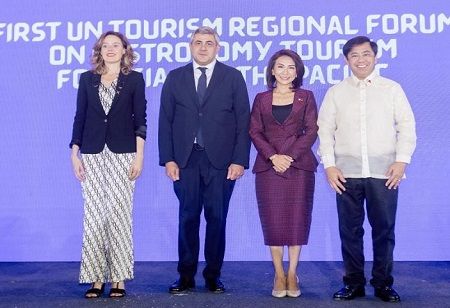The inaugural UN Tourism Regional Forum on Gastronomy Tourism for Asia and the Pacific aimed to build upon the global event's success by providing a platform for leaders from both public and private sectors. It addressed key challenges and opportunities in this rapidly growing sector of global tourism. Co-organized by UN Tourism and the Basque Culinary Centre (BCC), and hosted by the Department of Tourism of the Philippines, the forum underscored Member States' dedication to maximizing the economic and social advantages of gastronomy tourism. Central themes included policy frameworks and governmental initiatives.
During the opening Ministerial Dialogue at the event, Christina Garcia Frasco, Secretary of the Philippines Department of Tourism, was joined by Martini M. Paham, Deputy Minister for Resources and Institutions at Indonesia's Ministry of Tourism and Creative Economy, Jakkaphon Tangsutthitham, Vice Minister of Thailand's Ministry of Tourism and Sports, Mitsuaki Hoshino, Vice-Commissioner of Japan's Ministry of Land, Infrastructure, Transport and Tourism under the Japan Tourism Agency, and Maria Helena de Senna Fernandes, Director of the Macao Government Tourism Office in China. Together, these ministers advocated for policies and strategies aimed at maximizing the benefits of gastronomy tourism. They emphasized the importance of integrating tourism with sectors such as agriculture, culture, and rural development.
UN Tourism Secretary-General Zurab Pololikashvili said, “Food is at the heart of every tourist experience, and gastronomy tourism delivers many social and economic benefits. For it to deliver on its potential, we need to create well-defined gastronomy tourism policies and strategies that bring together all stakeholders with a common vision and mission, as exemplified by this first regional Forum”.
The event concluded with the Cebu Call to Action on Gastronomy Tourism, calling for both public and private sector leaders to develop comprehensive strategies at all levels to integrate gastronomy tourism into policy and practice. It urges the creation of governance mechanisms uniting stakeholders under a shared vision, fostering cooperation across sectors such as agriculture and culture, and supporting small businesses to enhance their market position. Emphasis was placed on empowering local communities through training and financing, promoting unique culinary experiences, and advocating for sustainable practices that protect local cultures and the environment.
Aligned with UN Tourism’s commitment to inclusive rural development, inclusion, and sustainability, the Forum convened academics, business leaders, community representatives, and top chefs to address critical issues in gastronomy tourism. The focus was on managing the sector in harmony with and empowering host communities and local traditions. This included promoting the use of local products, fostering stronger connections with agriculture and creative industries, and blending heritage with contemporary trends. The event also featured the "Chefs Leading Change" initiative, showcasing three UN Tourism Ambassadors for Sustainable Tourism: Chef Pilar Rodriguez from Chile, Chef Rudolf Stefan from Croatia, and Chef Margarita Fores from the Philippines.

